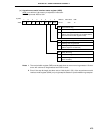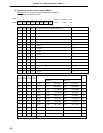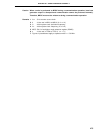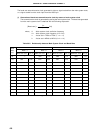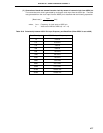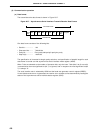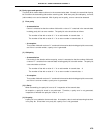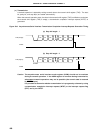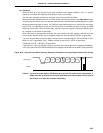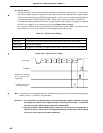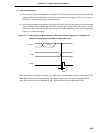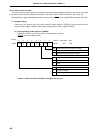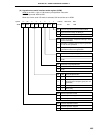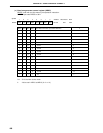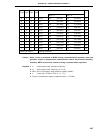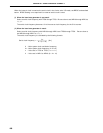
481
CHAPTER 20 SERIAL INTERFACE CHANNEL 2
(d) Reception
When the RXE bit of the asynchronous serial interface mode register (ASIM) is set (1), a receive
operation is enabled and sampling of the RxD pin input is performed.
RxD pin input sampling is performed using the serial clock specified by ASIM.
When the RxD pin input becomes low, the 5-bit counter of baud rate generaor (see Figure 20-2) starts
counting, and at the time when the half time determined by specified baud rate has passed, the data
sampling start timing signal is output. If the RxD pin input sampled again as a result of this start timing
signal is low, it is identified as a start bit, the 5-bit counter is initialized and starts counting, and data
sampling is performed. When character data, a parity bit and one stop bit are detected after the start
bit, reception of one frame of data ends.
When one frame of data has been received, the receive data in the shift register is transferred to the
receive buffer register (RXB), and a reception completion interrupt request (INTSR) is generated.
If an error is generated, the receive data in which the error was generated is still transferred to RXB.
When an error is generated, if bit 1 (ISRM) of ASIM is cleared to 0, INTSR is generated.
If ISRM bit is set to 1, INTSR is not generated.
If the RXE bit is reset (0) during the receive operation, the receive operation is stopped immediately.
In this case, the contents of RXB and ASIS are not changed, and INTSR and INTSER are not generated.
Figure 20-9. Asynchronous Serial Interface Reception Completion Interrupt Request Generation Timing
Caution The receive buffer register (RXB) must be read even if a receive error is generated. If
RXB is not read, an overrun error will be generated when the next data is received, and
the receive error state will continue indefinitely.
D1 D2 D6 D7 ParityD0RxD (Input)
INTSR
STOP
START



